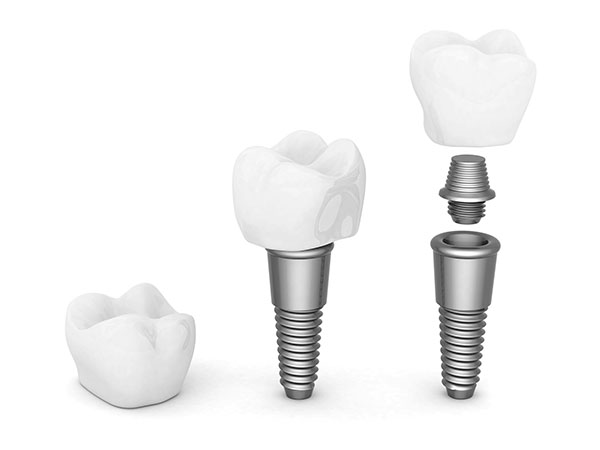What You Should Know About The Dental Implant Procedure
 What is the dental implant procedure?
What is the dental implant procedure?
A dental implant is a tiny prosthetic device placed into your jawbone under the gum line, in order to help replace a missing tooth or lost teeth. This dental implant procedure is what we use to place the implant and consists of several steps to ensure that you have the strongest, most stable dental implant placement. The procedure starts with a complete and very comprehensive examination. While there are very few factors that may preclude you from getting a dental implant, part of our job is to ensure that you have none of those factors and are a great candidate for dental implants. We do this by examining your mouth, taking a full oral history, and using dental imaging like x-rays and a CT scan to measure the density of your jawbone. If there are any infections, cavities, or other minor problems, we will want to clear those up before we proceed to the dental implant stage. During the dental implant procedure, we will be placing a tiny titanium screw into the jawbone. Once this has healed, we will use an abutment, or a small device that sticks up above the gum line, to connect to your new false tooth. This new tooth, also known as a dental crown, will be the only thing you will see and use. Meanwhile, the implant itself, which is the main focus of the dental implant procedure, will be working below the surface to ensure that your new replacement tooth remains stable and secure for a very long time.
During the dental implant procedure, why do you measure the jawbone so thoroughly?
The jawbone is the most critical part of the body when it comes to sustaining and supporting the dental implant. In order to do this, the jawbone has to have a level of density and bone mass, which provides strength. It also has to be able to sustain the oral surgery. In many senses, the jawbone is the foundation of your house, meaning if the ground cannot sustain the foundation, the entire house is weak. Unfortunately, one of the side-effects of tooth loss is that the jawbone starts to deteriorate. This happens through a perfectly natural process known as resorption. Our job is to make sure that the foundation into which we are placing the implant is secure and stable, which is why we take exceptional care to measure and examine the jawbone itself. The bottom line for you is that a weakened jawbone, or one that is not sufficiently dense, does not automatically preclude you from getting the dental implant procedure you need. It merely adds another dimension, the need for a bone graft.
How is the dental implant procedure impacted by the need for a bone graft?
In terms of the process, the only change is the time it takes for you to heal from the bone graft surgery. This is typically around six months, after which we will have a very strong and stable part into which we can place the dental implant.
Related Posts
Dental implants can bring back stability and aesthetic value to your mouth. Losing at least one tooth can affect your appearance. It can also affect the way you interact with other people. Getting implants is a big decision. That is why you need to know what the procedure entails. Here are the things you should…
Most people want to have dental implants right after dental extraction. Replacing the lost tooth is a priority. This can prevent more complications as the mouth heals. Understanding the process of getting implants after dental extraction can help prepare you for your appointment. Here are the details about getting dental implants after a dentist removes…
Dental implants are long-lasting, permanent tooth replacements. They are a popular choice among patients for their durability and ability to look and feel like natural teeth. However, dental implants are an investment, and they should be cared for as such. Follow the tips below to help extend the life span of your implants and prevent…
Dental implants are effective, long-lasting artificial teeth. Implants are surgically attached to the jawbone to look and function like natural teeth. As a result, patients can chew, talk, and laugh without worrying about dentures slipping. They also improve oral health. This article explores when and why to get implants and the qualifying factors for treatment.Patients…
 What is
What is